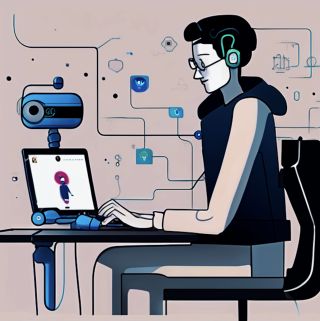Artificial Intelligence
The Emergence of Private LLMs
When memory meets privacy, an LLM becomes a life-long companion.
Updated April 23, 2024 Reviewed by Tyler Woods
Key points
- Private LLMs and extended memory are set to revolutionize personal assistants.
- Private LLMs give users control over data, while extended memory enables highly personalized interactions
- New LLMs will support personal growth, optimize routines, and help users reach their full potential.

The role of Large Language Models (LLMs) is about to change. Two groundbreaking advancements are set to redefine the way we interact with personal assistants: the rise of private LLMs and the expansion of prompt memory. This powerful combination of memory and privacy in LLMs is poised to create the most sophisticated and influential personal assistants ever conceived, offering unprecedented insights while safeguarding user confidentiality. In the simplest of terms, you just might be finding a new BFF—best friend forever.
Empowering User Control
The advent of private LLMs marks a fundamental shift in the relationship between users and language models. Traditionally, LLMs have relied on centralized systems where data is stored and processed on external servers, raising concerns about privacy and data security. However, private LLMs upend this model by residing directly on users' personal devices, ensuring that sensitive information remains firmly under the control of the individual.
This decentralized approach empowers users with unprecedented autonomy over their data, allowing them to dictate how their information is utilized and shared. By harnessing the computational capabilities of personal devices, private LLMs eliminate the need for external data storage, mitigating the risks associated with unauthorized access or misuse. This newfound sense of ownership and privacy fosters a deeper level of trust between users and their personal assistants, encouraging more open and authentic interactions.
One of the most significant advantages of private LLMs is their ability to liberate users from the limitations and restrictions imposed by public language models. Public models often come with a set of predefined rules and constraints, dictating what types of content can be generated and how the model should respond to certain queries. These restrictions, while well-intentioned, can sometimes hinder the user's creativity and limit the scope of their interactions. In contrast, private LLMs offer a more open and unrestricted environment, allowing users to explore ideas, generate content, and engage in conversations without the fear of being constrained by external policies. This freedom enables users to tap into the full potential of language models, fostering innovation and facilitating more authentic and uninhibited expression.
Enabling Continuity and Personalization
Historically, one of the primary limitations of digital personal assistants has been their inability to maintain context and retain information from previous interactions effectively. However, the advent of extended prompt memory in LLMs is set to revolutionize this aspect of user experience. By equipping personal assistants with the capacity to remember and draw upon past conversations and interactions, LLMs can now provide seamless continuity and deliver highly personalized assistance.
Extended memory enables LLMs to build a comprehensive understanding of each individual user over time. By retaining and analyzing the rich tapestry of a user's preferences, habits, and experiences, personal assistants can anticipate needs, provide more accurate and relevant responses, and offer tailored recommendations that align with the user's unique profile. This level of personalization fosters a deeper connection, perhaps even a functional friendship, between users and their AI companions, creating a more engaging and rewarding interaction.
The Synergy of Memory and Privacy
The convergence of memory and privacy in LLMs gives rise to a transformative synergy that elevates the capabilities and utility of personal assistants to new heights. By residing on the user's own device, private LLMs ensure that personal information remains secure and confidential, accessible only to the individual. This privacy-centric approach instills a sense of trust, encouraging users to share more extensive and intimate details about their lives, knowing that their data is protected from external exploitation.
Concurrently, the extended memory of LLMs complements this privacy by enabling the creation of a comprehensive and ever-evolving record of an individual's life journey. This localized memory allows personal assistants to provide deeply contextual responses, recall previous interactions with precision, and offer insights that are tailored to the user's specific circumstances. The amalgamation of memory and privacy creates a powerful feedback loop, where increased trust leads to more comprehensive data sharing, which in turn enhances the accuracy and relevance of the assistant's guidance.
Unlocking Profound Insights and AI-Assisted Growth
The fusion of memory and privacy in LLM-based personal assistants unlocks a realm of extraordinary insights and AI-assisted capabilities that have the potential to transform various aspects of our lives. By leveraging the vast repository of personal information stored securely on the user's device, LLMs can identify patterns, offer data-driven recommendations, and provide actionable insights across domains such as productivity, health, education, and personal development.
This AI-assisted ecosystem empowers individuals to make more informed decisions, optimize their routines, and unlock their full potential. LLMs can analyze a user's habits, identify areas for improvement, and suggest personalized strategies to enhance well-being and achieve goals. Moreover, the privacy-preserving nature of these interactions fosters an environment of trust, enabling users to engage in deep self-reflection and explore sensitive topics without fear of judgment or data misuse.
The Future of Personal Assistants
The convergence of memory and privacy in LLMs signifies a new chapter in the story of personal assistants. Private LLMs put users in the driver's seat, giving them full control over their data, while extended memory enables unparalleled personalization and context-aware interactions.
As LLMs continue to evolve, we can anticipate a future where AI becomes a seamless extension of ourselves, helping us navigate life's challenges, optimize our potential, and discover new frontiers of personal growth. The synergy between memory and privacy will give rise to remarkably powerful tools that not only support us but also help us uncover hidden aspects of our own capabilities.




